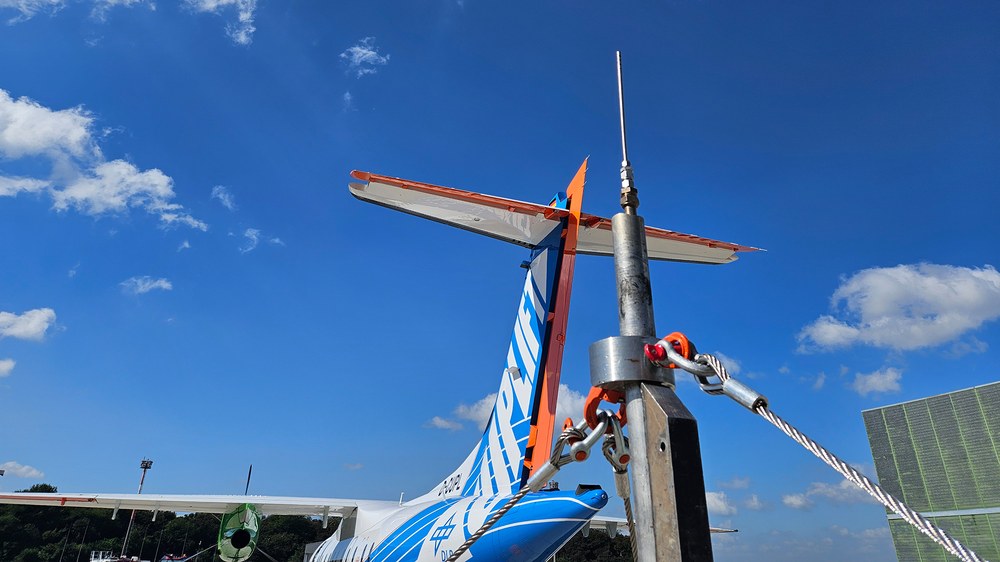First ground-based emission measurements behind a turboprop aircraft powered by synthetic fuel



- World's first emission measurements of a turboprop aircraft powered by synthetic, aromatic-free Power-to-Liquid (PtL) proxy fuel.
- Insights into the dispersion and composition of the exhaust plume and the ageing of aerosols.
- Upcoming flight measurements in October will provide further important insights into the application and efficiency of synthetic fuels in turboprop aircraft.
- Focus: Aeronautics, climate-compatible aviation, sustainable fuels
The German Aerospace Center (Deutsches Zentrum für Luft- und Raumfahrt; DLR) and the German aircraft manufacturer Deutsche Aircraft have, for the first time, have tested both engines of DLR's D328® UpLift research aircraft powered by 100 percent synthetic fuel and carried out emission measurements on the ground. These were the first emission measurements in the world to be conducted on a turboprop aircraft powered by a synthetic, aromatic-free power-to-liquid (PtL) proxy fuel. Flight tests for in-flight emission measurements with DLR's D328® UpLift and Falcon 20E are scheduled for October.
The extensive emission measurements in the aircraft's exhaust gas took place in mid-September on the grounds of Oberpfaffenhofen Airport. "While the use of alternative fuels in jet aircraft has already been investigated in several studies, systematic data on the emission behaviour of turboprop engines is still lacking," explains Nina Gaiser, Head of the Ground Measurement Campaign at the DLR Institute of Combustion Technology. "For this reason, studies on how pollutant emissions change when using aromatic and sulphur-free synthetic fuel compared to standard kerosene are of particular scientific interest."
Detailed analysis at all engine power levels
For the tests, a team from the DLR Institute of Combustion Technology in Stuttgart developed a measuring probe that was installed at Oberpfaffenhofen Airport for these experiments. While the pilot runs through the various thrust stages of the LTO cycle (Landing and Take-Off Cycle) with the aircraft on the ground, the probe takes exhaust gas samples and sends them to the mobile laboratory of the DLR Institute of Combustion Technology, which is located at a safe distance from the aircraft. In the mobile laboratory, the researchers can determine both the composition of the exhaust gas and the number, size and distribution of the particles it contains. In contrast to in-flight measurements, all engine load conditions can be specifically controlled and analysed in detail on the ground. This ground-based approach allowed researchers to examine all engine load states in detail, from low-thrust taxi operations to high-thrust take-offs. These thrust settings in particular have a significant impact on air quality on the ground. In addition to the emission measurements directly at the engine outlet, the researchers are particularly interested in different distances between the sampling and the engine, which, among other things, provide important insights into the dispersion and ageing of aerosols in the exhaust plume.
In a previous series of tests, the researchers had already analysed a dual-mode configuration in which one engine was operated with PtL proxy fuel and the other with conventional kerosene (Jet A-1). The preliminary results of the dual-mode tests showed a significant reduction in particulate emissions when PtL proxy is used. The upcoming flight measurements in October will provide further important insights into the application and efficiency of synthetic fuels.
In the future, electricity-based fuels (PtL) will be produced as SAF (Sustainable Aviation Fuel) from carbon dioxide and water using renewable energies, thus offering the potential to reduce the carbon footprint by more than 95 percent. The fuel used in UpLift, a 100 percent aromatic-free Fischer-Tropsch Synthetic Paraffinic Kerosene (FT-SPK), is chemically and process-technically equivalent to PtL, which will be available in the future (as ‘PtL proxy’). The fuel is provided by the company Sasol.
DLR's research aircraft D328® UpLift
The D328® UpLift is used as a flying test laboratory for climate-compatible aviation technologies, such as fully synthetic fuels or hydrogen as a possible sustainable aircraft fuel of the future. The flying test laboratory is to be used by industry, SMEs and start-ups, as well as research institutions, to test new, climate-compatible system, fuel and propulsion technologies under real-life conditions and to significantly accelerate their practical use in aviation. The research aircraft was only added to the DLR research fleet last year and is now being used in its first major research campaign.
The current measurement campaigns with the D328® UpLift are part of the UpLift-CLIM0ART research project, which is funded by the Aviation Research Programme (LuFo-Klima) of the Federal Ministry for Economic Affairs and Climate Action (BMWK).
